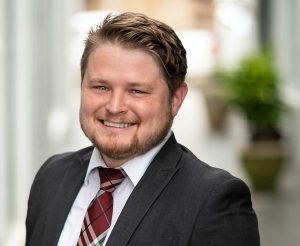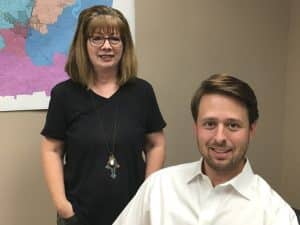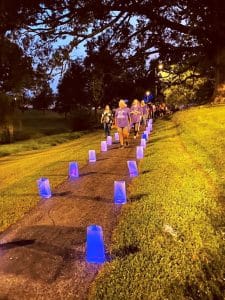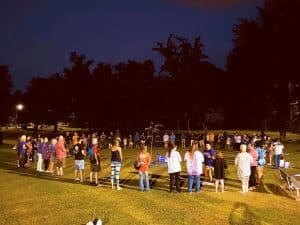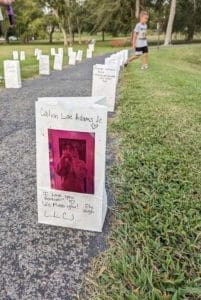News
Should the DeKalb County General Sessions Court be full time?
September 6, 2023
By: Dwayne Page
Should the DeKalb County General Sessions Court be full time?
Judge Brandon Cox believes it should and he addressed the issue with members of the government services committee of the county commission last month. He plans to make a formal request later in the year with the committee and the full county commission for implementation in the 2024-25 fiscal year. Judge Cox just marked his first year on the bench as General Sessions Judge September 1st. He was elected to his first eight-year term in August, 2022.
All 95 Tennessee counties have General Sessions Courts but some General Sessions Judges including DeKalb County are only part-time. The Tennessee General Assembly has the authority to make the courts full time, even during a judge’s current term, by special legislative action at the request of counties.
Since its origins, the General Sessions Court in DeKalb County has been a part time court with specific jurisdictions and judges who have served on the bench have been free to continue their private practice of law. But the times are changing, and Judge Cox said there is a growing need to expand the jurisdiction of the court to offer more services.
Although it is considered to be part time, Judge Cox said you probably wouldn’t know it by what happens there in a given week.
“My one-year mark on the bench was September 1 and I don’t know that I could ever really call it a part time position because I am in court 3-5 times a week and the court dockets are usually from 7 to 25 pages,” said Judge Cox.
“Every Tuesday I have the Recovery Court (formerly known as Drug Court) docket and sometimes following that child support dockets. Once a month on Tuesdays there is a docket just for preliminary hearings in criminal cases. Wednesdays is our civil docket, juvenile, and Department of Children Service (DCS) cases. Thursdays is the criminal docket and juvenile delinquent dockets after that. Mondays are for special set hearings or emergency hearings. For example, if a juvenile is put in detention for some reason on a Friday the law says we must have a hearing on the following Monday. If a child gets removed and put in state custody through an ex parte order they must have a hearing within 72 hours,” Judge Cox continued.
If the court were made full time, it would have a broader jurisdiction and be able to offer more services.
“Right now, I am over criminal cases, recovery court, child support, juvenile, DCS matters, civil disputes, and evictions. If my position were to be transferred from part time to full time, it would add domestic jurisdiction, basically divorces, and adoption jurisdiction. The domestic jurisdiction for DeKalb County is currently at our Circuit Court or Chancery Court level with Judges Caroline Knight, William Ridley, and Chancellor Ronald Thurman which means even if a (divorce) case is filed here, its not necessarily heard here. Attorneys sometimes have to go wherever the judge is holding court in the district on a specific day for their case to be heard. And while as a part time judge I can rule on parental rights, I can’t do adoptions. By making our General Sessions Court full time, it would become a dedicated court and make it more efficient for everybody involved”.
If changed to full time, Judge Cox said the court would operate on a full five-day schedule and he would have to give up his private practice for as long as he is judge.
“The court would operate from 8 a.m. until 4:30 p.m. five days a week. Right now I am trying to be a part time attorney but that is very difficult with the schedule I have,” he said.
As part of his plans for community outreach, Judge Cox said he would like to start a Big Brothers, Big Sisters type mentoring program and get more involved with students in the school system.
“I think its good for them (students) to see me and for me to see them before they get into trouble. I have already made visits to the Middle School, West School, and High School to talk about major issues we are dealing with,” said Judge Cox.
“I also want to expand our recovery court to include a mental health court. And I will be starting a Safe Baby Court, which I will talk about in more detail later. I want DeKalb County to have a full-service court system to offer as much as we can to be as equipped as any county as far as what’s available out there. We have a lot of needs but not all the resources to deal with them. If you look at a map of Tennessee and look at locations of service providers, we are known as the black hole of the state because there is nothing here. As far as service providers, there’s Haven of Hope and that’s it. There is nothing else here,” said Judge Cox.
While working to offer more services to the county, Judge Cox said his desire is to make the court operate more efficiently and he has already enacted measures to do that.
“My goal is to be as efficient as possible and that’s one of the biggest changes we have made in the last year. Our criminal cases are every Thursday, but the preliminary hearing docket has shifted to Tuesdays. Most of the time on Thursday’s now is for announcements, pleas, bindovers, etc and there’s movement in our cases. If somebody wants to have a preliminary hearing, then their cases are set on that one day each month on Tuesdays. Prior to me taking the bench, every officer that had a case on the docket had to be in court every Thursday, whether they were working, whether they had worked the night before, or whether it was their day off, and that led to significant overtime for the officers. Now, these officers have to come to court maybe once a month and that has resulted in a significant savings in the county and cities overtime budgets for the officers. Today (Tuesday) for example if you came to court, you might see 15-20 officers. They were here for two hours. Before they would be here for three or four hours a week, every single week,” said Judge Cox.
In order for the court to become full time, the county commission, by a two thirds majority would have to adopt a resolution asking the Tennessee General Assembly to enact legislation specifically for DeKalb County. The state legislature did the same for Johnson County in 2021.
Not only would the duties of the judgeship change, so would the salary of the judge. According to the 2023-24 budget, the DeKalb County General Sessions Court Judge is to earn $117,519 for the year. Although its not yet been determined what the salary would be if the court were made full time, the pay would be significantly more.
“A lot of this (salary) is statutorily set,” said Judge Cox. “Each county is classified by population, and we are in sort of the middle ground classification whether it could be either a part time or full-time court depending upon what the county commission elects to do.
In order to lessen the financial burden to the county, Judge Cox said he has come up with an idea for raising perhaps as much as $60,000 a year toward the salary which the state allows by assessing filing fees and other costs currently not charged on the approximately 3,000 cases that come before the General Sessions and Juvenile Courts. As a full time court, Judge Cox said he could also start a cost docket to enforce delinquent payments to increase the collection rate.
Eligible Residents Encouraged to Sign Up to Be Poll Workers for 2024 Elections
September 5, 2023
By: Dwayne Page
The 2024 elections are just months away and eligible DeKalb County residents are encouraged to serve their community by signing up to be poll workers.
“Poll workers are fundamental to running safe and secure elections in Tennessee,” said Dustin Estes, DeKalb County Administrator of Elections. “That is why I encourage all eligible DeKalb Countians to serve their community by signing up to be poll workers.”
During early voting and on Election Day, poll workers help polling sites in their community run smoothly by conducting various tasks, including greeting voters, answering questions, explaining how to cast a ballot, and counting votes.
Poll workers are paid for working during early voting and on Election Day, as well as for attending required training sessions.
Most Tennesseans are eligible to work as poll workers, regardless of political affiliation.
Qualifications to Be a Tennessee Poll Worker:
Be at least 16 years old
Be a registered voter in the county if 18 or older
Be able to read and write in the English language
Not be a candidate or close relative of a candidate
Not be supervised by a county or municipal elected worker on the ballot
Government Employees Who Can Serve as Poll Workers:
All City, County and Metro employees (unless working directly under the supervision of an elected official on the ballot)
State of Tennessee employees
Federal employees – consult your Human Resources Department to ensure eligibility.
“County election commissions are already preparing for the 2024 elections,” said Tennessee Coordinator of Elections Mark Goins. “By serving as a poll worker, you will help voters confidently cast a ballot and protect the integrity of the ballot box.”
For the latest information about becoming a poll worker of Tennessee elections, follow the Secretary of State’s social media channels Twitter: @TNSecofState, Facebook: Tennessee Secretary of State and Instagram: @tnsecofstate.
To serve your community as a poll worker, apply now at GoVoteTN.gov.
Glowstick Vigil Held to Honor and Remember Survivors and Victims of Drug Overdose
September 4, 2023
By: Dwayne Page
As part of September National Recovery Month, the DeKalb Prevention Coalition marked International Overdose Awareness Day on Friday with an event that honored those who have died from drug overdoses and provided resources for those battling drug addiction.
The event, held at Greenbrook Park featured guest speakers, hot dogs and chips, and a free overdose reversal training for all. Highlights of the program included a purple glow stick vigil, a walk in the park on the trail lined with paper glow bags, and a gathering of participants around a tree planted recently with a plaque dedicated as a “living remembrance of the lives lost too soon due to drug overdose, and as an inspiration to youth to choose to live drug free”.
“I lost my sister to an overdose in 2005 and the message I want people to get is there’s a way out and they don’t have to die from this disease. Never give up! There is hope. A lot of resources are out there to help and you don’t have to suffer alone,” said Amanda Parsley, one of the guest speakers at the event.
“DeKalb Prevention, along with community partners, remembered those friends and family we have lost to overdose. We spent a lot of time reflecting, praying, and shedding some tears. Afterwards we focused on looking forward to HOPE through our Prevention work and supporting each other with love. We walked the path lined with the names of those lost to overdose and we made a circle around our Remembrance Tree and spoke their names. Over 150 individuals participated. Thank you all for making the night such a special event,” said Jennifer Matthews, Director of the DeKalb County Prevention Coalition.
« First ‹ Previous 1 294 384 392 393 394395 396 404 494 2492 Next › Last »






